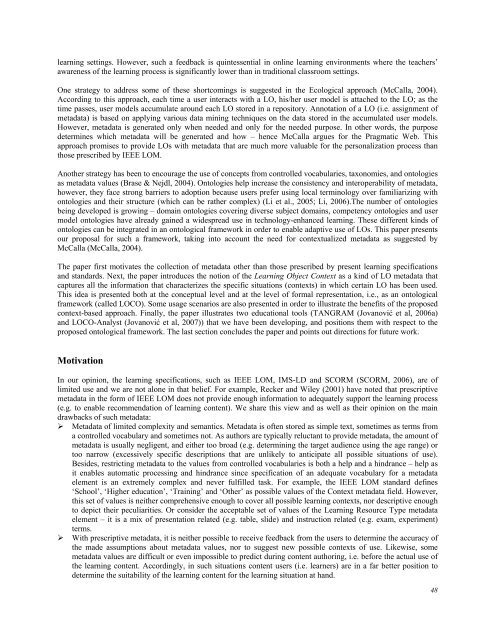July 2007 Volume 10 Number 3 - Educational Technology & Society
July 2007 Volume 10 Number 3 - Educational Technology & Society
July 2007 Volume 10 Number 3 - Educational Technology & Society
Create successful ePaper yourself
Turn your PDF publications into a flip-book with our unique Google optimized e-Paper software.
learning settings. However, such a feedback is quintessential in online learning environments where the teachers’<br />
awareness of the learning process is significantly lower than in traditional classroom settings.<br />
One strategy to address some of these shortcomings is suggested in the Ecological approach (McCalla, 2004).<br />
According to this approach, each time a user interacts with a LO, his/her user model is attached to the LO; as the<br />
time passes, user models accumulate around each LO stored in a repository. Annotation of a LO (i.e. assignment of<br />
metadata) is based on applying various data mining techniques on the data stored in the accumulated user models.<br />
However, metadata is generated only when needed and only for the needed purpose. In other words, the purpose<br />
determines which metadata will be generated and how – hence McCalla argues for the Pragmatic Web. This<br />
approach promises to provide LOs with metadata that are much more valuable for the personalization process than<br />
those prescribed by IEEE LOM.<br />
Another strategy has been to encourage the use of concepts from controlled vocabularies, taxonomies, and ontologies<br />
as metadata values (Brase & Nejdl, 2004). Ontologies help increase the consistency and interoperability of metadata,<br />
however, they face strong barriers to adoption because users prefer using local terminology over familiarizing with<br />
ontologies and their structure (which can be rather complex) (Li et al., 2005; Li, 2006).The number of ontologies<br />
being developed is growing – domain ontologies covering diverse subject domains, competency ontologies and user<br />
model ontologies have already gained a widespread use in technology-enhanced learning. These different kinds of<br />
ontologies can be integrated in an ontological framework in order to enable adaptive use of LOs. This paper presents<br />
our proposal for such a framework, taking into account the need for contextualized metadata as suggested by<br />
McCalla (McCalla, 2004).<br />
The paper first motivates the collection of metadata other than those prescribed by present learning specifications<br />
and standards. Next, the paper introduces the notion of the Learning Object Context as a kind of LO metadata that<br />
captures all the information that characterizes the specific situations (contexts) in which certain LO has been used.<br />
This idea is presented both at the conceptual level and at the level of formal representation, i.e., as an ontological<br />
framework (called LOCO). Some usage scenarios are also presented in order to illustrate the benefits of the proposed<br />
context-based approach. Finally, the paper illustrates two educational tools (TANGRAM (Jovanović et al, 2006a)<br />
and LOCO-Analyst (Jovanović et al, <strong>2007</strong>)) that we have been developing, and positions them with respect to the<br />
proposed ontological framework. The last section concludes the paper and points out directions for future work.<br />
Motivation<br />
In our opinion, the learning specifications, such as IEEE LOM, IMS-LD and SCORM (SCORM, 2006), are of<br />
limited use and we are not alone in that belief. For example, Recker and Wiley (2001) have noted that prescriptive<br />
metadata in the form of IEEE LOM does not provide enough information to adequately support the learning process<br />
(e.g. to enable recommendation of learning content). We share this view and as well as their opinion on the main<br />
drawbacks of such metadata:<br />
Metadata of limited complexity and semantics. Metadata is often stored as simple text, sometimes as terms from<br />
a controlled vocabulary and sometimes not. As authors are typically reluctant to provide metadata, the amount of<br />
metadata is usually negligent, and either too broad (e.g. determining the target audience using the age range) or<br />
too narrow (excessively specific descriptions that are unlikely to anticipate all possible situations of use).<br />
Besides, restricting metadata to the values from controlled vocabularies is both a help and a hindrance – help as<br />
it enables automatic processing and hindrance since specification of an adequate vocabulary for a metadata<br />
element is an extremely complex and never fulfilled task. For example, the IEEE LOM standard defines<br />
‘School’, ‘Higher education’, ‘Training’ and ‘Other’ as possible values of the Context metadata field. However,<br />
this set of values is neither comprehensive enough to cover all possible learning contexts, nor descriptive enough<br />
to depict their peculiarities. Or consider the acceptable set of values of the Learning Resource Type metadata<br />
element – it is a mix of presentation related (e.g. table, slide) and instruction related (e.g. exam, experiment)<br />
terms.<br />
With prescriptive metadata, it is neither possible to receive feedback from the users to determine the accuracy of<br />
the made assumptions about metadata values, nor to suggest new possible contexts of use. Likewise, some<br />
metadata values are difficult or even impossible to predict during content authoring, i.e. before the actual use of<br />
the learning content. Accordingly, in such situations content users (i.e. learners) are in a far better position to<br />
determine the suitability of the learning content for the learning situation at hand.<br />
48

















